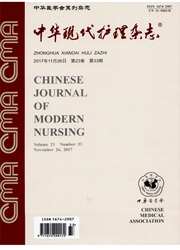

 中文摘要:
中文摘要:
目的:探讨舒适护理对胸外科电视胸腔镜术后患者焦虑程度的影响。方法将148例胸心外科胸腔镜术患者随机分为对照组75例和观察组73例,对照组执行常规护理方法,观察组执行舒适护理方法,比较两组患者术前和术后焦虑程度。结果术前1 d两组患者SAS评分均有升高,平均(55.58±177;12.33)分;两组患者焦虑程度比较,差异无统计学意义(χ2=0.7,P>0.05)。术后7 d观察组患者中无焦虑16.44%,轻度焦虑61.64%,中度焦虑17.81%,重度焦虑4.11%,对照组分别为13.33%,13.33%,70.67%,2.67%,两组比较差异有统计学意义(χ2=46.88,P<0.05)。结论舒适护理能增进胸外科患者术后护患沟通,减轻术后患者焦虑程度,有助于促进患者术后康复,提高护理质量。
 英文摘要:
英文摘要:
Objective To investigate the effect of comfort care on patients ’ anxiety after video-assisted thoracoscope surgery ( VATS) .Methods 148 patients were randomly divided into the control group ( n=75 ) and the observation group ( n=73 ) .The control group performed routine nursing care , while the observation group performed special comfort care .Patients ’ anxiety on 1 day before operation and 7 days after operation were compared between groups .Results Patients’ mean score of anxiety on 1 day before operation was (55.58 ±177; 12.33).There was no significant difference between groups (χ2 =0.7, P>0.05).For the patients in the observation group, 16.44%had no anxiety, 61.64%had a mild anxiety, 17.81%had a moderate anxiety, and 4.11%had a severe anxiety 7 days after operation.For the patients in the control group , 13.33% had no anxiety, 13.33%had a mild anxiety, 70.67%had a moderate anxiety, and 2.67%had a severe anxiety 7 days after operation.The difference was significant (χ2 =46.88, P <0.05).Conclusions The comfort care intervention can improve the nurse-patient communication and can reduce the degree of anxiety . It also contributes to promoting the postoperative rehabilitation of patients and improving the quality of nursing care .
 同期刊论文项目
同期刊论文项目
 同项目期刊论文
同项目期刊论文
 期刊信息
期刊信息
